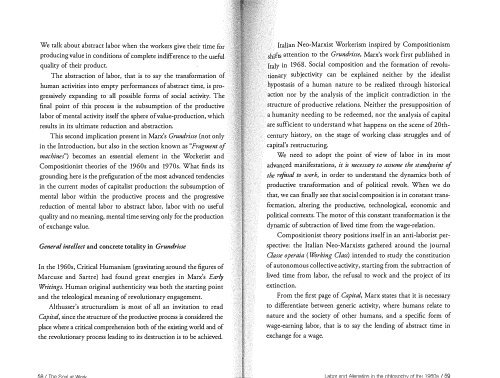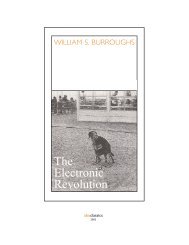Franco ''Bifo'' Berardi - The Soul at Work From Alienation to Autonomy
Franco ''Bifo'' Berardi - The Soul at Work From Alienation to Autonomy
Franco ''Bifo'' Berardi - The Soul at Work From Alienation to Autonomy
Create successful ePaper yourself
Turn your PDF publications into a flip-book with our unique Google optimized e-Paper software.
LAhor and AlienAtion in the ohilosonrlV of lhfJ 19608 / 59<br />
We talk about abstract labor when rhe workers give their time for<br />
producing value in conditions of complete indifference <strong>to</strong> rhe useful<br />
quality of their product.<br />
<strong>The</strong> abstraction of labor, th<strong>at</strong> is <strong>to</strong> say the ttansform<strong>at</strong>ion of<br />
human activities in<strong>to</strong> empty performances of abstract time, is pro<br />
gressively expanding <strong>to</strong> all possible forms of social activity. <strong>The</strong><br />
final point of this process is the subsumption of the productive<br />
labor of mental activity itself the sphere of value-production, which<br />
results in its ultim<strong>at</strong>e reduction and abstraction.<br />
This second implic<strong>at</strong>ion present in Marx's Grundrisse (not only<br />
in the Introduction, but also in the section known as "Fragment of<br />
machines") becomes an essential element in the <strong>Work</strong>erist and<br />
Compositionist theories of the 1960s and 1970s. Wh<strong>at</strong> finds its<br />
grounding here is the prefigur<strong>at</strong>ion of the most advanced tendencies<br />
in the current modes of capitalist production: the subsumption of<br />
mental labor within the productive process and the progressive<br />
reduction of mental labor <strong>to</strong> abstract labor, labor with no useful<br />
quality and no meaning, mental time serving only for the production<br />
of exchange value.<br />
General intellect and concrete <strong>to</strong>tality in Grundrisse<br />
In the 1960s, Critical Humanism (gravit<strong>at</strong>ing around the figutes of<br />
Marcuse and Sartre) had found gre<strong>at</strong> energies in Marx's Early<br />
Writings. Human original authenticity was both the starting point<br />
and the teleological meaning of revolutionary engagement.<br />
Althusser's structuralism is most of all an invit<strong>at</strong>ion <strong>to</strong> read<br />
Capital, since the structure of the productive process is considered the<br />
place where a critical comprehension both of the existing world and of<br />
the revolution<strong>at</strong>y process leading <strong>to</strong> its destruction is <strong>to</strong> be achieved.<br />
Italian Neo-Marxist <strong>Work</strong>erism inspired by Compositionism<br />
shifts <strong>at</strong>tention <strong>to</strong> the Grundrisse, Marx's work first published in<br />
Italy in 1968. Social composition and the form<strong>at</strong>ion of revolutionary<br />
subjectivity can be explained neither by the idealist<br />
hypostasis of a human narure <strong>to</strong> be realized through his<strong>to</strong>rical<br />
action nor by the analysis of the implicit contradiction in the<br />
structure of productive rel<strong>at</strong>ions. Neither the presupposition of<br />
a humanity needing <strong>to</strong> be redeemed, nor the analysis of capital<br />
are sufficient <strong>to</strong> understand wh<strong>at</strong> happens on the scene of 20thcentury<br />
his<strong>to</strong>ry, on the stage of working class struggles and of<br />
capital's restructuring.<br />
We need <strong>to</strong> adopt the point of view of labor in its most<br />
advanced manifest<strong>at</strong>ions, it is necessary <strong>to</strong> assume the standpoint of<br />
the refosal <strong>to</strong> work, in order <strong>to</strong> understand the dynamics both of<br />
productive transform<strong>at</strong>ion and of political revolt. When we do<br />
th<strong>at</strong>, we can finally see th<strong>at</strong> social composition is in constant transform<strong>at</strong>ion,<br />
altering the productive, technological, economic and<br />
political contexts. <strong>The</strong> mo<strong>to</strong>r of this constant transform<strong>at</strong>ion is the<br />
dynamic of subtraction of lived time from the wage-rel<strong>at</strong>ion.<br />
Compositionist theory positions itself in an anti-Iaborist perspective:<br />
the Italian Neo-Marxists g<strong>at</strong>hered around the journal<br />
Classe operaia (<strong>Work</strong>ing Class) intended <strong>to</strong> study the constirution<br />
of au<strong>to</strong>nomous collective activity, starting from the subtraction of<br />
lived time from labor, the refusal <strong>to</strong> work and the project of its<br />
extinction.<br />
<strong>From</strong> the first page of Capital, Marx st<strong>at</strong>es th<strong>at</strong> it is necessary<br />
<strong>to</strong> differenti<strong>at</strong>e between generic activity, where humans rel<strong>at</strong>e <strong>to</strong><br />
n<strong>at</strong>ure and the society of other humans, and a specific form of<br />
wage-earning labor, th<strong>at</strong> is <strong>to</strong> say the lending of abstract time in<br />
exchange for a wage.




